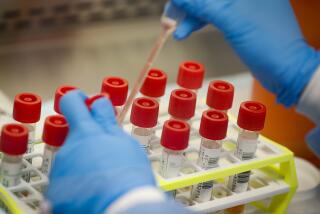Confidence in Blood Supply Up, Poll Finds
- Share via
WASHINGTON — Growing understanding about AIDS is building Americans’ confidence in the safety of the nation’s blood supply, but many still believe that it is likely they could get the disease by receiving or donating blood, said a poll released Tuesday.
The poll conducted for the American Assn. of Blood Banks found that 66% believe that the blood supply is safer today than five years ago, up from 56% last year and 44% in 1985 when screening for AIDS in blood donations began.
The survey shows “the American public understands the steps being taken to protect the blood supply,” said Laurence A. Sherman, president of the association.
He said, however, gaps remain in the public’s understanding.
More than half of those surveyed, 52%, said they believe that it is unlikely they could get AIDS from a blood transfusion. However, 44% considered it likely.
Extremely Low Chances
In fact, Sherman said, the chances of getting AIDS from a transfusion are extremely low. Since 1985, public health officials estimate that about 60 people have been infected with the virus through transfusions, a tiny fraction of the 4 million to 5 million transfusions performed each year in the United States.
“We’re not happy with 60,” but that is far lower than the 30,000 that are believed to have been infected before procedures were initiated to screen out AIDS-contaminated blood, said Gilbert Clark, executive director of the association.
“The American public wants zero risk . . . but zero risk is unattainable,” as with any medical procedure, he said.
Blood banks receive about 12 million blood donations a year.
Three-quarters of those polled said it was unlikely someone could get AIDS from donating blood, but 20% erroneously believed that it was likely.
Sherman noted that the proportion of the public believing that AIDS could be transmitted while giving blood has dropped from 34% in 1985, but he said this faulty belief has made it more difficult to recruit blood donors.
Overall, the nation’s blood supply is “marginal” and the amount of blood in the system has been unchanged for the last several years.
He said that donating takes more time today than it did before 1985 because blood banks require more detailed questioning of donors as part of the AIDS-screening efforts. Blood that is donated is also subjected to an antibody test to detect the presence of the AIDS virus.
For the second year in a row, the survey found that AIDS was ranked as the most serious health problem facing the country, ahead of cancer, heart disease and drug abuse. However, fewer--31% this year compared to 36% last year--gave it top ranking.
Black Americans were the only group that showed increasing concern about AIDS, with 48% ranking it as the top health problem, up from 42% last year.
Among the other findings:
* Contracting AIDS through a transfusion and difficulties during recuperation shared second place, each cited by 17%, as the greatest concerns in the case of an operation. The top concern, 27%, was complications due to errors made by doctors and medical staff. Sixteen percent cited complications from anesthesia.
* 41% said they believe that they have “a lot” of accurate information about AIDS, up 4 points from last year and 20 points since 1985.
* 16% of those polled said they personally knew someone infected with the AIDS virus, but 82% said they did not.
* 91% favored criminal penalties for people who donate blood when they know they are infected with the AIDS virus.
* 82% would require that people who test positive for AIDS be reported to health officials, and 81% would require mandatory testing of high-risk groups, such as drug users, homosexuals and prostitutes.
The telephone poll, conducted by Hamilton & Staff of Washington, surveyed 1,000 randomly selected adults between June 23 and July 6. The sampling error for the survey is plus or minus 3 percentage points.
More to Read
Sign up for Essential California
The most important California stories and recommendations in your inbox every morning.
You may occasionally receive promotional content from the Los Angeles Times.













